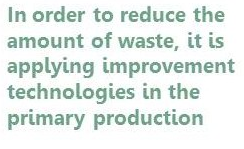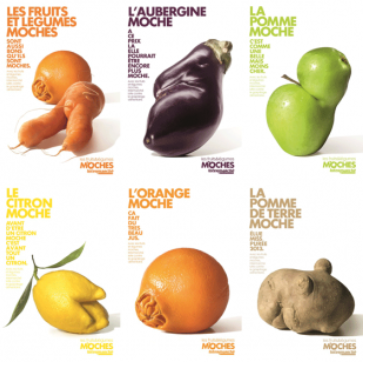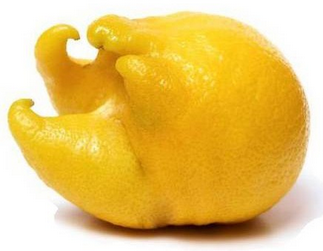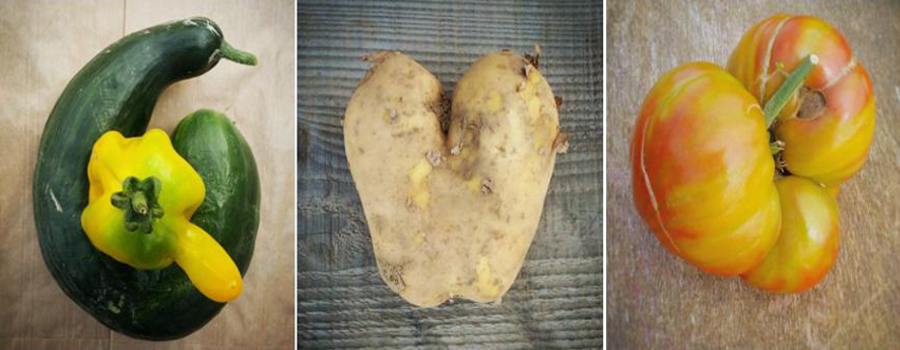“True beauty lies within”, this words have been heard for all of us and in this way we have learned at home. But the reality is far from the theory when we are talking about fruits and vegetables.

Around 30% of the food waste problem is related with the primary production and one cause is that the fruits and vegetables dismissed by the exigencies in terms of quality (shape, size, appearance, etc). For instance, 20% of the potatoes are sorted out in Swedish potato farms due to quality standards (Mattssonet al., 2001). It is true that a lot of these products end up in other industries, like processing/ feed industries, but some produce is left unharvest or wasted. If it was not because they are the “wallflower”, they could arrive to the consumer because they have the same nutritive and organoleptic characteristics.
From this point of view, have appeared in some countries different initiatives which hope contribute to reduce the food waste commercializing theses “ugly” fruits and vegetables.
In 2014, European year against food waste, the French supermarket chain Intermarché launched in their stores the initiative “Inglorious fruits and vegetables”. With a massive global campaign and 30% cheaper, Intermarché decided to sell these non-calibrated and imperfect fruits and vegetables that it is not usually find it in a store, besides they put on sell soups and juices made from these vegetables to show at the consumers that these products could be so good like any other. The initiative was a successful and they got sell 1,2 tonns in a couple of days.
To encourage the purchase of these vegetables other supermarkets like Tesco and Sainsbury (UK) have started to offer these vegetables in their stores, and so reduce the food waste. Asda, the second supermarket chain more important in UK, put “wonky veg box” on sale by 3,50 pounds, 30% less than standard lines.

In Germany, two women launched a crowdfunding campaign to promote the benefits to consume vegetables that were not accepted in terms of quality. They work directly with local farmers and supermarkets that discard these veg and make dishes that then they sell in a coffee shop, labelling as “Culinary Misfits”.
Terms of quality are not the only reason for the primary production have the majority of the food waste. Inappropriate agronomic practices and wrong variety choices produce inferior quality leading to high losses in the selection process. A lake of appropriate resources during storage and transport or mechanic damage by multiple handling can increase the damage, especially for highly perishable commodities such as fruits and vegetables.
To reduce these amounts of waste it is carrying out some improvements techniques in the primary production, new post-harvest technologies (new silos, protection of storage cereal to pest, new packaging materials, temperature control, etc.), all these improvements have to adapt to the place where they applied remain affordable with respect to local conditions. Often some simple and economic solutions in transport, production and packaging can reduce food losses and waste in development countries (Millennium Project of the United Nations, 2005; FAO 2011B).

In this sense works the Postharvest Education Foundation, with educational programs aimed at reducing food losses, maintaining quality, market value, nutritional value and food safety, and access to references, resources, training activities and mentoring services for young professionals in the field of postharvest technology.
To struggle against the food waste in fisheries, the French organization “La Panier de la mer” collaborates with different fishing ports, where it picks fish that not are been sold or it can’t be sell and it would throw it away. This fish is transformed into fillets or freezing that them it distributes to different food aid associations.
Fish Fight are been worked in the fight against the fish discards at the sea, putting pressure on the politicians to find more sensible criteria in this sense (In 2015 Europeans politicians have voted to ban the discards). Currently it focuses on their struggle to finish with botton-trawling and the promotion of artisan fishing, finding a sustainable production with the environment and avoiding massive catches that increase waste.
These are just some initiatives to change the production system in which we are living and consuming, which must change among all to get a model that can feed the world’s population in a fair and sustainable way with the environment.
- Fermentation, travel partner - 5 July 2024
- A pilot experience with a constructed wetland - 23 August 2018
- Plastic planet - 3 July 2018
